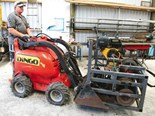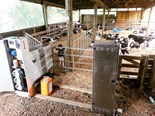Fighting disease with genetics
Using CRV Ambreed’s facial eczema-tolerant bulls is helping Whakatane farmer Richard Sisam combat the disease on his farm.
Facial eczema causes liver damage and results in reduced milk production and, in severe cases, animal deaths. Liver damage is caused by sporidesmin toxin produced by the pithomyces chartarum fungus which thrives in hot and humid weather.
"We’ve been using semen from facial eczema-tolerant bulls for six years," says Richard. "We know for sure that our tolerance levels are increasing." He also uses zinc on the farm. Richard considers facial eczema a scourge.
Spore counts reached three million in some parts of the country in 2016, the highest spore counts seen in a decade, and many herds had a large number of cows with subclinical facial eczema.
"We’ve sold tens of thousands of straws of semen from facial eczema-tolerant bulls— around triple our sales last year—following the worst facial eczema season in years," says CRV Ambreed global grazing product manager Peter van Elzakker.
Sheep success
Richard has seen how breeding for facial eczema tolerance has benefitted the sheep sector of the agricultural industry whose national flock is far more tolerant than three decades ago.
Waipa sheep farmer Edward Dinger, winner of three Beef + Lamb New Zealand Sheep Industry Awards, says facial eczema hit his district hard last season, with the spore count quadruple the levels seen in most years. "It was close to a million spores per gram of grass," says Edward. "Genetics is certainly part of the answer. I have been breeding facial eczema-tolerant sheep for 31 years."
In similar conditions in 1981 Mr Dinger lost around a third of his 2000 strong flock, but last season he only lost about a dozen of his flock of 600 sheep.
A long term solution
Over the past six years, CRV Ambreed has marketed facial eczema-tolerant Crossbred, Friesian and Jersey teams, of between six and eight animals each. "The team approach helps managing the risk and creates options," says Peter. "Every year we challenge new prospect bulls and look for individual bulls with improved tolerance to increase overall tolerance in dairy herds."
More and more of CRV Ambreed’s 150-strong bull catalogue have increased facial eczema tolerance and semen from Holstein- Friesian bulls, Glowing and Skylark, are selling particularly well. "If we can select bull dams with high tolerance that goes a long way to lifting the bar. We expect our facial eczema-tolerant sires to be 25 percent less reactive to a dose of facial eczema."
Edward is watching CRV Ambreed’s progress in breeding facial eczema-tolerant dairy cattle with interest. "You can breed facial eczema-tolerant cattle through progeny testing. It’s a bigger and more thorough process than what we did with sheep, but it takes longer". Intelact vet and farm consultant Chris Pyke says there was no one solution that was completely effective against facial eczema. "If you can breed animals that are more tolerant it becomes part of a package."
CRV Ambreed research and development manager Phil Beatson believes a genetic tool is essential to combat facial eczema in the long term. "If global warming means we are going to get these sorts of devastating facial eczema events more frequently and over an increasing area of New Zealand, it’s going to become an even greater problem. It’s also quite possible that use of a heavy metal, zinc, may be restricted in the future. "Everything points to genetics offering the best long-term sustainable solution to this disease. Farmers need to be proactive now."
A step in the right direction
Te Awamutu-based VetEnt large animal vet Emma Cuttance completed her thesis on the management of facial eczema this year. "Long term we need to be thinking about genetics or pastures that reduce the risk of facial eczema.
CRV Ambreed is quite rightly following the long term genetics option. In sheep it has been successful. While it is not 100 per cent in very high risk years, it is a massive step in the right direction. Focussing on genetics in combination with pastures and crops that reduce the risk will hopefully reduce the need for zinc treatment or fungicide treatment.
Long term, this will be a better solution for the environment." She says farmers needed to be thinking 20 to 30 years in advance about the gains that could be made through genetics.
About CRV Ambreed
CRV Ambreed’s business is built around one goal: helping dairy farmers achieve their highest performing herd possible. Working with the CRV Ambreed team provides dairy farmers with insight into genetic performance and capability; a range of products and services to suit individual needs; and access to worldclass expertise and support.
Keep up to date in the industry by signing up to Farm Trader's free newsletter or liking us on Facebook
















